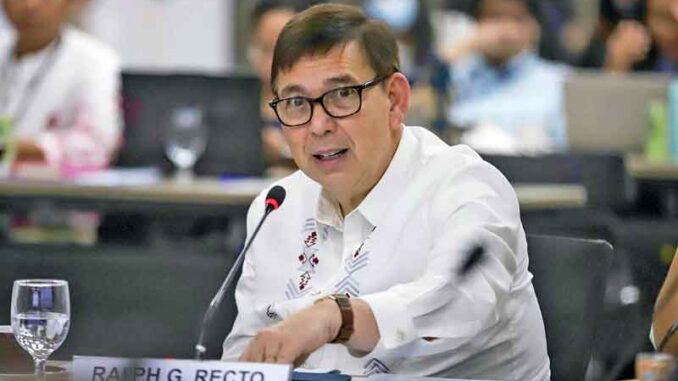
Finance Secretary Ralph Recto said Wednesday the Philippines expects to reduce its debt level as a percentage of the gross domestic product by 2028.
“We are following our macro fiscal framework of reducing the deficit over time. We expect the good debt‑to‑GDP to be way below 60 percent by 2028. Today, it roughly at 60 percent,” Recto said during the high-level meeting of ministers and governors on Oct. 22, 2024 at the IMF headquarters in Washington D.C.
Recto made the statement as the International Monetary Fund (IMF) said it expects GDP growth in the Philippines to reach 5.8 percent in 2024 and 6.1 percent in 2025, following a 5.5-percent expansion in 2023. Growth is expected to pick up to 6.3 percent by 2029.
The IMF sees Philippine inflation settling at 3.3 percent in 2024 and 3.0 percent in 2025 and its current account to yield a deficit of 2.2 percent of GDP in 2024 and 1.8 percent of GDP in 2025. It predicted that unemployment rate in the country would average 4.4 percent in 2024 and 5.2 percent in 2025.
Recto said the Philippine economy grew 6.3 percent in the second quarter of 2024 and achieved an averaged expansion of 6.0 percent in the first two years of the Marcos administration.
“On the expenditure side, we are spending roughly 5 to 6 percent on infrastructure, maybe a similar amount also for human resource development, particularly in health and education,” he said.
Recto said the business process outsourcing (BPO) sector contributes roughly $35 billion in revenues annually, or at the same level of remittance from overseas Filipino workers. “That helps our consumption, and 70 percent of the economy is household consumption. Public investments have also generated most of that growth as well,” he said.
Recto is optimistic about generating more investments from the United States, despite the outcome of the presidential election.
“Well, in the Philippines, we do have a relationship with the US. We have a Mutual Defense Treaty. We are hoping to leverage that relationship, so that we do not get much affected. We understand that many US companies are also interested to invest in the Philippines. We do have a partnership—the U.S.-Japan-and the Philippines, with regards to our security arrangements. We expect more investments to take place also in the Philippines,” he said.


Be the first to comment